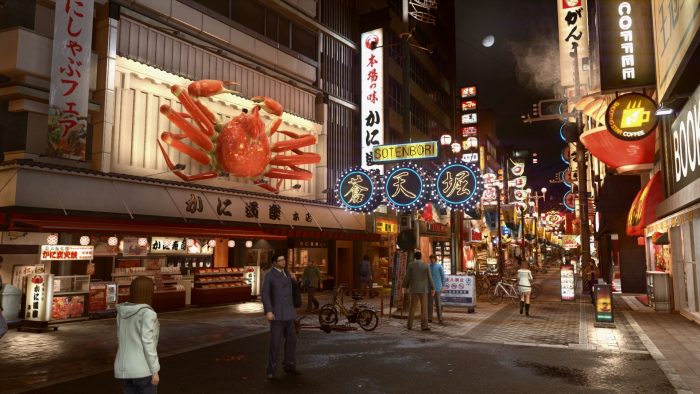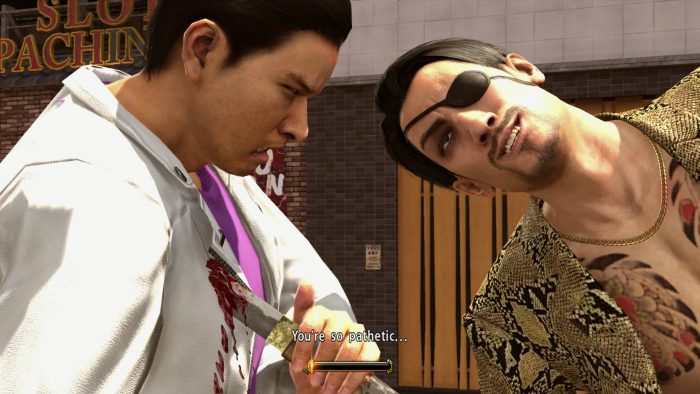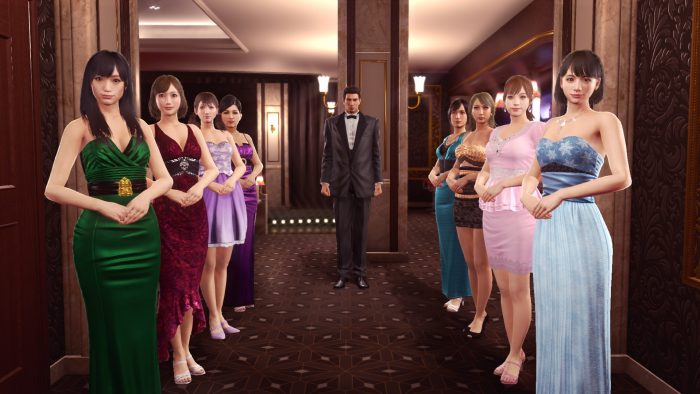How do you follow up a successful remake of the first title of a long-running franchise? By remaking the second title of a long-running franchise!
The Tojo Clan is in crisis! After the events of Yakuza Kiwami, the Dragon of Dojima, Kazuma Kiryu, has settled down to take care of his lost love Yumi’s daughter. But after the assassination of the fifth chairman of the Tojo, he is pulled into a cold war between the weakened remnants of his former clan and a powerful rival yakuza organization, the Omi Alliance. Desperately trying to find a way to defuse tensions before all-out war erupts, Kiryu finds himself in direct conflict with his counterpart in the Omi Alliance, Ryuji Goda, the Dragon of Kansai. Their struggle will turn friends to foes, test the strongest loyalties, and in the end, reshape the future of the Tojo clan forever.
The very first thing I noticed in Kiwami 2 was the significant graphical upgrade over the PS2-era Yakuza 2. Unlike Yakuza 0 and Kiwami, this remake utilizes the new Dragon Engine built for Yakuza 6. There’s not only improved character models with more realistic skin textures and natural facial animation, but also a dramatically expanded and immersive environment. In past Yakuza games, the setting of Kamurocho, Tokyo was as important as any character, yet it often felt lifeless. Though there were dozens of people walking the streets, the vast majority of storefronts were empty window dressing. With the graphical upgrade, storefronts are now full of people. When you enter a building, the camera follows you in rather than fading to black to load up a new location. These improvements make Kamurocho feel much more like a real, lived-in city rather than a Hollywood backlot. Kiwami 2 also features the first appearance of Sōtenbori, a place familiar to anyone who has played Yakuza 0, Yakuza 5, or Yakuza: Like a Dragon. This Osaka entertainment district (based on the real-life Dōtonbori) offers an entirely new environment to explore, even though it entirely cuts the Shinseicho district found in the original game.

One of the major pitfalls that most remakes fall into is that, while the graphics are modernized, the dated mechanics remain. There are no worries about this with Kiwami 2, as it takes its combat system wholesale from Yakuza 6. This is a modern, polished version of the traditional button-mashing brawler, much more streamlined than in Kiwami. Rather than switching between different combat styles, all of your attacks and skills are integrated into Kiryu’s trademark Dragon Style. Heat actions, where you unleash your full fury on foes, are still there, but there is an increased emphasis on charging up your basic attacks and using weapons in combat (and, unfortunately, quicktime events). Much like the game’s previous entries, the random encounter system becomes teeth-grindingly annoying by the end of the game. Even after you’ve upgraded all of your skills, you still keep accumulating experience points without anything to spend them on. Random fights with weak delinquents and gangs stop being about becoming stronger and become irritating obstacles in the way of enjoying the game.
Yakuza games have always excelled in their sound design, with solid music, acting, and bone-crushing sound effects. Kiwami 2 boasts a great soundtrack, with dozens of musical themes that never get tiresome and always compliment the action. However, there are some very odd musical choices, including heavy metal songs with vocals overlaying key emotional moments in the story. Personally, I preferred the ambient soundtrack, but that might come down to musical tastes more than anything. And, of course, there are some amazing original songs you can sing along with down at the karaoke parlor!
Just like with the rest of the Yakuza series, there is no English voice dub available for Yakuza Kiwami 2. This is a good thing, as playing the game with the Japanese language and English subtitles reinforces the incredible authenticity of the setting and culture. The Japanese voice actors are exceptional. Even if you don’t understand the language, you are fully drawn into the emotional performances of the characters. And boy, there are emotions galore because we’re dealing with pure melodrama here. That said, melodrama can be pretty fun and silly! Unfortunately, the plot loses much of its focus around the midsection of the game, relying on fetch quests between the two city settings to extend the playtime. This kills the momentum of the story, especially in parts where Kiryu is given quest directives like “Wander aimlessly,” as you wait for something to happen in the plot.
As is usual with the Yakuza series, there are several returning characters, including everyone’s favorite sociopathic mad dog, Goro Majima! He is as entertaining as ever, stealing the show every time he appears. The game even includes a lengthy side-campaign starring Majima as a playable character for the first time since Yakuza 0. The best part is that, unlike with many breakout characters, the developers of Kiwami 2 know not to overuse him. He shows up just long enough to make an impression and leaves you wanting more.

Another place where Kiwami 2 excels is the villain. The antagonists of Kiwami mostly kept to the shadows (in fact, the main villain didn’t even show up until the very last chapter), but the primary antagonist of Kiwami 2, Ryuji Goda, is front and center throughout. A dark reflection of Kiryu, he makes for an ideal villain, with layers of complexity and emotional depth that most villains lack. He utterly commands every scene he appears in, setting the standard for Yakuza villains from this point onward.
It’s a bit of a relief to me that Kiwami 2 has made some progress in the way it treats women and LGBTQ+ characters. The game still isn’t a shining example of progressive values, but queer characters thankfully aren’t treated as jokes or comic relief this time around. Trans characters are given far more respect (and thankfully, you aren’t required to beat any of them up, something that made me incredibly uncomfortable in the previous game). There are still problematic story elements and sections, but the improvement here is encouraging to see. Women are also treated with more respect, as your partner for the majority of the game is a no-nonsense cop nicknamed the Yakuza Hunter. There are still moments where you need to “come to her rescue,” but she can throw down with just as much as skill as Kiryu.
But really, who cares about graphics, plot, characters, and combat systems? If you’re playing a Yakuza game, you’re here for the side content! And, as usual, there is a ridiculous amount of it. There are the usual hundred or so substories and side activities like baseball, darts, pool, mahjong, and fighting in the coliseum. But there are also two fantastic games within the game: the Clan Creator and Cabaret Club Grand Prix. Though similar side quests were included in previous installments of the series, they are expanded to great effect here.
The Clan Creator is a full-blown tower defense game where you protect Majima Construction (yes, Majima owns a construction company now with his own theme song and everything, just go with it) from rival real estate developers who want a piece of the action through any means possible. By recruiting recurring characters and people you saved in substories, you put together a team of defenders to protect Majima’s equipment and supplies from wave after wave of enemy attacks. My main problem with the Clan Creator is that it doesn’t provide you with a reward equal to the time you put into it. It’s fun, but aside from unlocking a new tournament category in the coliseum, you can skip it without worries that you’ll miss out on any big rewards.
The Cabaret Club Grand Prix, on the other hand, is an absolute blast. A returning minigame from Yakuza 0, Kiryu becomes the manager of cabaret club Four Shine, recruiting and training cabaret girls to make it into the greatest club in Japan! While there is a strong underlying current of male savior-ism running through this sidequest, it’s thankfully offset by the strong and well-developed female characters that make up the heart of this story. Each cabaret girl has her own personality, preferences, wants, and dreams, and you quickly get invested in their struggle against the villainous Kanzaki Cabaret Group. Similar to the Clan Creator, the Grand Prix doesn’t end with a specific reward. It does, however, basically grant you an unlimited supply of money. In fact, fully completing the Grand Prix completely destroys the in-game economy, making you a multi-millionaire without very much effort.

Yakuza Kiwami 2 is a fantastic sequel and a game worthy of the Yakuza title. It improves on almost every aspect of the original, presenting a much more immersive version of Kamurocho and deepening the already compelling relationships between recurring characters. It has a better villain, more engaging side quests, and just the right amount of Majima. Yes, there are some annoyances, bugs, and pacing issues with the overall plot, but on the whole, this is a wonderful addition to the Yakuza franchise. I’m already looking forward to my next visit to Kamurocho!



